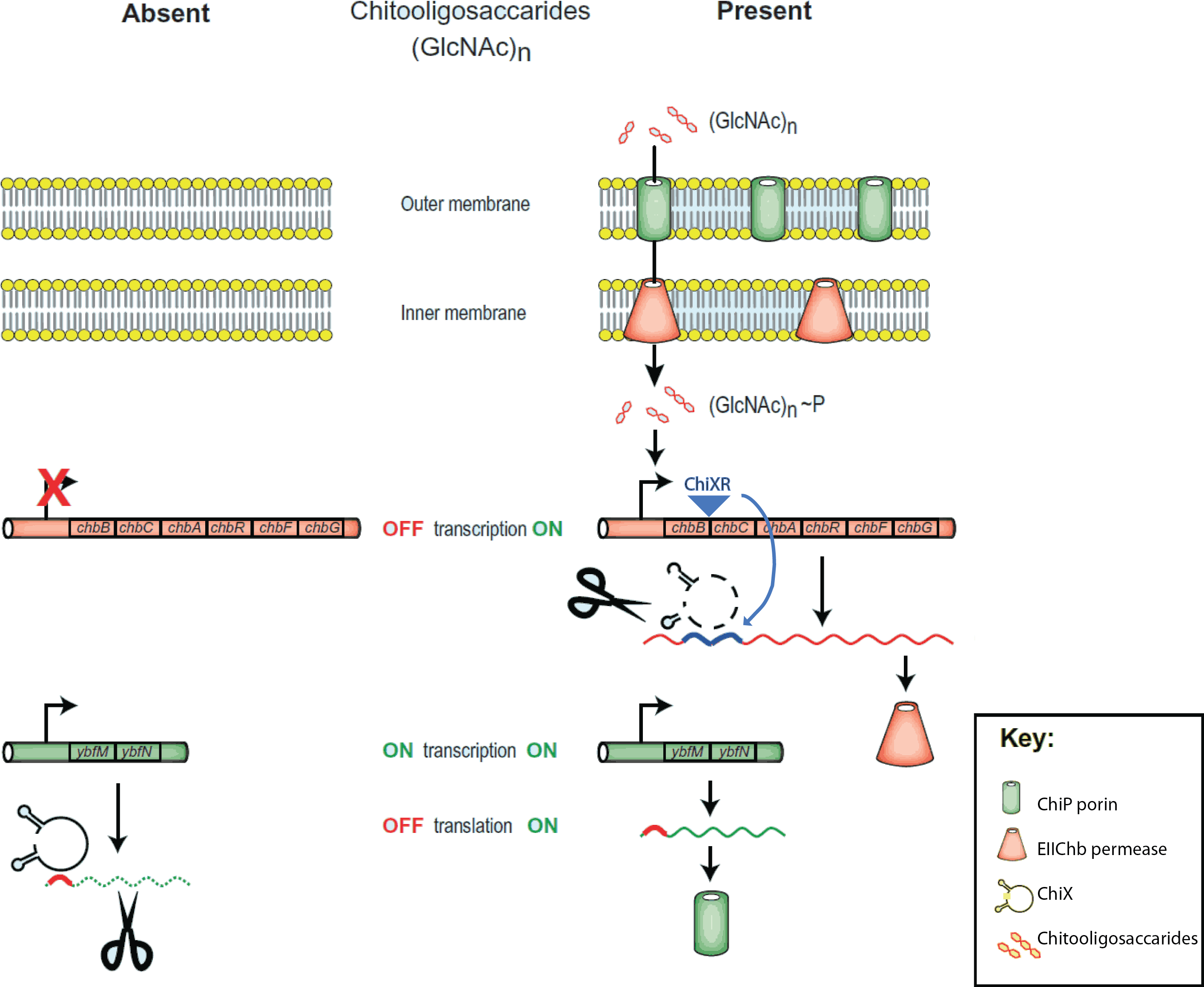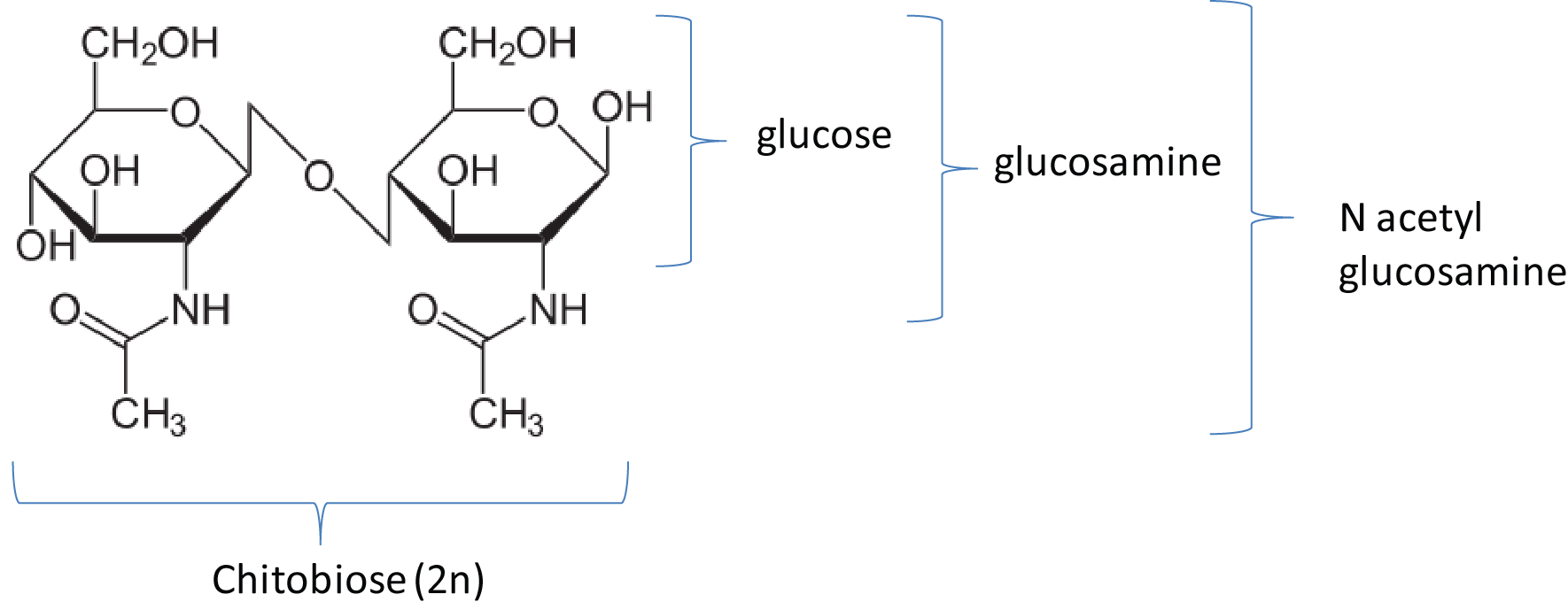Team:DTU-Denmark/Background the natural system
From 2011.igem.org
(→Regulation of chitobiose uptake in E. coli) |
|||
| (2 intermediate revisions not shown) | |||
| Line 1: | Line 1: | ||
{{:Team:DTU-Denmark/Templates/Standard_page_begin|The chitobiose system}} | {{:Team:DTU-Denmark/Templates/Standard_page_begin|The chitobiose system}} | ||
| + | |||
| + | |||
The project is inspired by the regulation of chitobiose uptake and metabolism in ''E. coli''<span class="superscript">[[#References|[1]]]</span>. Especially the following three players, which have been indentified independently in several organisms and thus goes by many names: | The project is inspired by the regulation of chitobiose uptake and metabolism in ''E. coli''<span class="superscript">[[#References|[1]]]</span>. Especially the following three players, which have been indentified independently in several organisms and thus goes by many names: | ||
| - | : 1. The '''mRNA''' for a chitoporin that transports chitosugars into cells, called | + | : 1. The '''mRNA''' for a chitoporin that transports chitosugars into cells, called '''chiP''' (alias ybfM) |
| - | : 2. A '''sRNA''' which regulates the chitoporin post-transcriptionally, called | + | : 2. A '''sRNA''' which regulates the chitoporin post-transcriptionally, called '''chiX''' (alias sroB, micM) |
: 3. A '''trap-sRNA''' which is transcribed from intergenic region in the chitobiose operon | : 3. A '''trap-sRNA''' which is transcribed from intergenic region in the chitobiose operon | ||
| - | : (chbBCARG), which we named | + | : (chbBCARG), which we named '''chiXR''' for chiX regulator. |
[[File:DTU1_Chitobiose.png|400px|thumb|right|Chitobiose; a disaccharide derived from chitin.]] | [[File:DTU1_Chitobiose.png|400px|thumb|right|Chitobiose; a disaccharide derived from chitin.]] | ||
| - | The sRNA ( | + | The sRNA (chiX) regulates chitoporin (chiP) expression through binding to the Shine Dalgarno sequence on the chiP mRNA inhibiting recruitment of the 30S ribosome and altering RNA stability. When chitobiose is present, trap-sRNA (chiXR) is transcribed and its transcript binds the sRNA (chiX), relieving chitoporin repression. |
| - | [[File:Chitobiose_system.png|650px|thumb|center| '''Overview of the ''E.coli'' chitobiose system'''. When Chitooligosaccarides are '''absent''', the chbBCARG operon and hence | + | [[File:Chitobiose_system.png|650px|thumb|center| '''Overview of the ''E.coli'' chitobiose system'''. When Chitooligosaccarides are '''absent''', the chbBCARG operon and hence chiXR is not transcribed, which in turns means that chiX is free to degrade chiP. Chitoporin is not produced. When Chitooligosaccarides are '''present''', the transcription of the chbBCARG operon is transcribed. The transcribed chiXR degrades chiX and chiP mRNA is translated. Chitoporin is produced. The figure is modified from figure 5 in<span class="superscript">[[#References|[1]]]</span>.]] |
Latest revision as of 04:15, 22 September 2011
The chitobiose system
The project is inspired by the regulation of chitobiose uptake and metabolism in E. coli[1]. Especially the following three players, which have been indentified independently in several organisms and thus goes by many names:
- 1. The mRNA for a chitoporin that transports chitosugars into cells, called chiP (alias ybfM)
- 2. A sRNA which regulates the chitoporin post-transcriptionally, called chiX (alias sroB, micM)
- 3. A trap-sRNA which is transcribed from intergenic region in the chitobiose operon
- (chbBCARG), which we named chiXR for chiX regulator.
The sRNA (chiX) regulates chitoporin (chiP) expression through binding to the Shine Dalgarno sequence on the chiP mRNA inhibiting recruitment of the 30S ribosome and altering RNA stability. When chitobiose is present, trap-sRNA (chiXR) is transcribed and its transcript binds the sRNA (chiX), relieving chitoporin repression.

References
[1] Overgaard, Martin, Jesper Johansen, Jakob Møller‐Jensen, and Poul Valentin‐Hansen. “Switching off small RNA regulation with trap‐mRNA.” Molecular Microbiology 73, no. 5 (September 2009): 790-800. http://onlinelibrary.wiley.com/doi/10.1111/j.1365-2958.2009.06807.x/abstract.
 "
"









